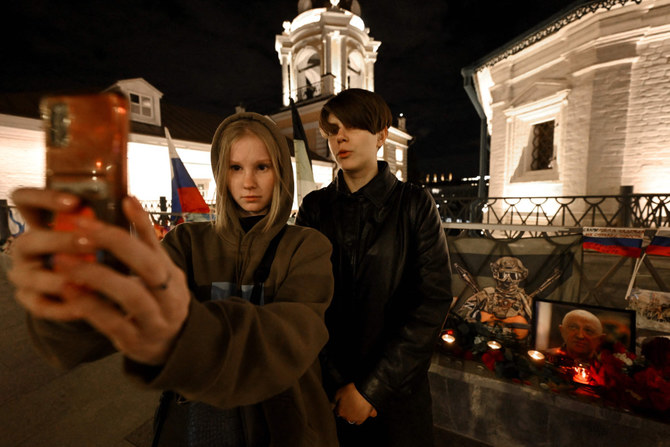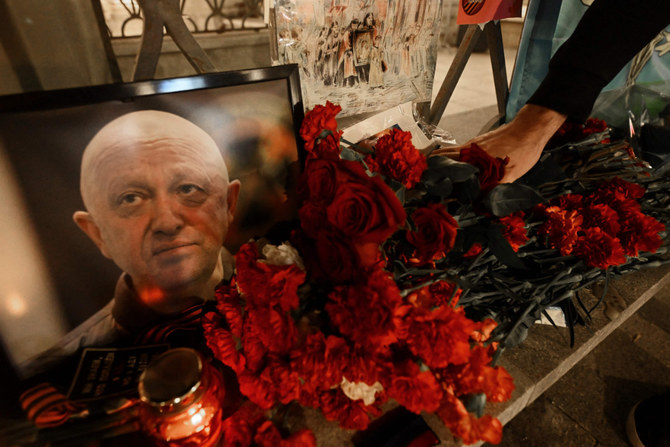WASHINGTON: A preliminary US intelligence assessment concluded that the plane crash presumed to have killed Russian mercenary leader Yevgeny Prigozhin was intentionally caused by an explosion as Russian President Vladimir Putin on Thursday eulogized the man who staged the biggest challenge to his 23-year rule.
One of the US and Western officials who described the initial assessment said it determined that Prigozhin was “very likely” targeted and that the explosion falls in line with Putin’s “long history of trying to silence his critics.”
The officials, who spoke on the condition of anonymity because they were not authorized to comment, did not offer any details on what caused the explosion, which was widely believed to have also killed several of Prigozhin’s lieutenants to avenge the mutiny that challenged the Russian leader’s authority.
Pentagon spokesman Gen. Pat Ryder said press reports that a surface-to-air missile took down the plane were inaccurate. He declined to say whether the US suspected a bomb.
Details of the intelligence assessment surfaced as Putin expressed his condolences to the families of those who were reported to be aboard the jet and referred to “serious mistakes” by Prigozhin.
The jet carrying the founder of the Wagner military company and six other passengers crashed Wednesday soon after taking off from Moscow with a crew of three, according to Russia’s civil aviation authority. Rescuers found 10 bodies, and Russian media cited anonymous sources in Wagner who said Prigozhin was dead. But there has been no official confirmation.

President Joe Biden, speaking to reporters Wednesday, said he believed Putin was behind the crash, though he acknowledged that he did not have information verifying his belief.
“I don’t know for a fact what happened, but I’m not surprised,” Biden said. “There’s not much that happens in Russia that Putin’s not behind.”
The passenger manifest also included Prigozhin’s second-in-command, who baptized the group with his nom de guerre, as well as Wagner’s logistics chief, a fighter wounded by US airstrikes in Syria and at least one possible bodyguard.
It was not clear why several high-ranking members of Wagner, including top leaders who are normally exceedingly careful about their security, were on the same flight. The purpose of their joint trip to St. Petersburg was unknown.
At Wagner’s headquarters in St. Petersburg, lights were turned on in the shape of a large cross, and Prigozhin supporters built a makeshift memorial, piling red and white flowers outside the building Thursday, along with company flags and candles.
In this first comments on the crash, Putin said the passengers had “made a significant contribution” to the fighting in Ukraine.
“We remember this, we know, and we will not forget,” he said in a televised interview with the Russian-installed leader of Ukraine’s partially occupied Donetsk region, Denis Pushilin.
Putin recalled that he had known Prigozhin since the early 1990s and described him as “a man of difficult fate” who had “made serious mistakes in life, and he achieved the results he needed — both for himself and, when I asked him about it, for the common cause, as in these last months. He was a talented man, a talented businessman.”
Russian state media have not covered the crash extensively, instead focusing on Putin’s remarks to the BRICS summit in Johannesburg via video link and Russia’s invasion of Ukraine.
Several Russian social media channels reported that the bodies were burned or disfigured beyond recognition and would need to be identified by DNA. The reports were picked up by independent Russian media, but The Associated Press was not able to independently confirm them.
Prigozhin supporters claimed on pro-Wagner messaging app channels that the plane was deliberately downed, including suggesting it could have been hit by a missile or targeted by a bomb on board.
Sergei Mironov, the leader of the pro-Kremlin Fair Russia party and former chairman of the upper house of the Russian parliament said on his Telegram channel that Prigozhin had “messed with too many people in Russia, Ukraine and the West.”
“It now seems that at some point, his number of enemies reached a critical point,” Mironov wrote.
Russian authorities have said the cause of the crash is under investigation.
Kuzhenkino resident Anastasia Bukharova, 27, said she was walking with her children Wednesday when she saw the jet, “and then — boom! — it exploded in the sky.” She said she was scared it would hit houses in the village and ran with the children, but it ended up crashing into a field.
“Something sort of was torn from it in the air,” she added.
Numerous opponents and critics of Putin have been killed or gravely sickened in apparent assassination attempts, and US and other Western officials long expected the Russian leader to go after Prigozhin, despite promising to drop charges in a deal that ended the June 23-24 mutiny.
“It is no coincidence that the whole world immediately looks at the Kremlin when a disgraced ex-confidant of Putin suddenly falls from the sky, two months after he attempted an uprising,” said German Foreign Minister Annalena Baerbock, while acknowledging that the facts were still unclear.
“We know this pattern … in Putin’s Russia — deaths and dubious suicides, falls from windows that all ultimately remain unexplained,” she added.
Ukrainian President Volodymyr Zelensky also pointed the finger: “We have nothing to do with this. Everyone understands who does.”
Soon after the plane went down, people on social media and news outlets began to report that it was a Wagner plane. Minutes after Russian state news agencies confirmed the crash, they cited the civil aviation authority as saying Prigozhin’s name was on the mainfest.
Prigozhin was long outspoken and critical of how Russian generals were waging the war in Ukraine, where his mercenaries were some of the fiercest fighters for the Kremlin. For a long time, Putin appeared content to allow such infighting — and Prigozhin seemed to have unusual latitude to speak his mind.
But Prigozhin’s brief revolt raised the ante. His mercenaries swept through the southern Russian city of Rostov-on-Don and captured the military headquarters there without firing a shot. They then drove to within about 200 kilometers (125 miles) of Moscow and downed several military aircraft, killing more than a dozen Russian pilots.
Putin first denounced the rebellion as “treason” and a “stab in the back.” He vowed to punish its perpetrators, and the world waited for his next move, particularly since Prigozhin had publicly questioned the Russian leader’s justifications for the war in Ukraine.
But instead Putin made a deal that saw an end to the mutiny in exchange for an amnesty for Prigozhin and his mercenaries and permission for them to move to Belarus.
Now many are suggesting the punishment has finally come.
The Institute for the Study of War argued that Russian authorities likely moved against Prigozhin and his top associates as “the final step to eliminate Wagner as an independent organization.”
Abbas Gallyamov, a former speechwriter for Putin turned political consultant, said by carrying out the mutiny and remaining free, Prigozhin “shoved Putin’s face into the dirt front of the whole world.”
Failing to punish Prigozhin would have offered an “open invitation for all potential rebels and troublemakers,” so Putin had to act, Gallyamov said.
Videos shared by the pro-Wagner Telegram channel Grey Zone showed a plane dropping like a stone from a large cloud of smoke, twisting wildly as it fell, one of its wings apparently missing. A free fall like that typically occurs when an aircraft sustains severe damage. A frame-by-frame AP analysis of two videos was consistent with some sort of explosion mid-flight.






























